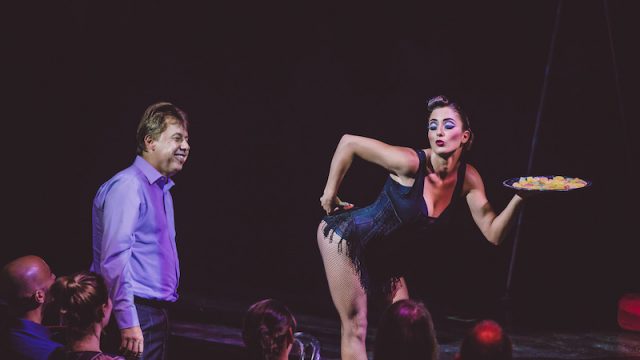Spiegeltent, Assembly George Square Gardens, Edinburgh Festival Fringe; 10th August 2017

Created by Recirquel, Hungary’s leading contemporary circus company, Paris du Nuit is inspired by Brassaï’s photography of the underground cabarets of 1930’s Paris. Accompanied by a live band with an original score, the large ensemble cast is exceptionally well costumed and every detail of this show feels considered, and infused with the aesthetics of the source material.
The circus skills are slick and of a very high standard, undertaken across a broad range of disciplines – including some not too frequently seen in the Edinburgh Fringe such as tightwire and a devised ‘aerial lamp’, used for one of the best scenes where a diminutive, clowny redhead bases her much larger male flyer. The choreography is tight, well-timed, and perfectly synchronised with both the musical and lighting clues, and the circus and dance skills flow seamlessly in and out of one another.
…and herein lies my problem with this show. It has achieved such a level of polish and poise that it feels devoid of any real sexuality or transgression. The trope of ‘sexy Parisian cabaret’ has become so over-used in contemporary film, television, and live performance that for me it has strayed well into cliche, and the glances, postures and performativity found in Paris du Nuit do not feel genuine to me. They feel sanitised and safe.

I’m not sure if fleshing out the characters a little more would help, or if perhaps depicting a ‘backstage’ life with loucher choreography would provide some contrast and depth but, as it is, I do not believe that the characters on the stage before me are sexual creatures.
The one scene which feels like it has any political and emotional weight is a beautiful duo trapeze act performed by two young men, one in high heels, one barefoot, to a rendition of the iconic ‘What makes a man a man‘. This act is satisfying not only because of the technical skill level and tenderness of the interaction between the two artists, but also because it is the only act in the show that begins to hint at the darkness of the time period: the impending political crisis within Europe, the oppression that existed outside of the vibrant world of the cabarets, and the very real threat that homosexuals found themselves under. The risk of being publicly ‘outed’ transforms and translates into the vulnerability and risk of falling from the trapeze.
Not all circus shows need to please me, and I’m glad that not all of them meet my tastes as that would be a monotonous and very limited world. The crowds seem to really love this show, and I understand that the sexuality which sells is a sexuality which is palatable. For me though, in trying so hard to please the palate, this show has become bland.
This response was produced as part of the #CircusVoices scheme for developing critical languages around circus arts.




